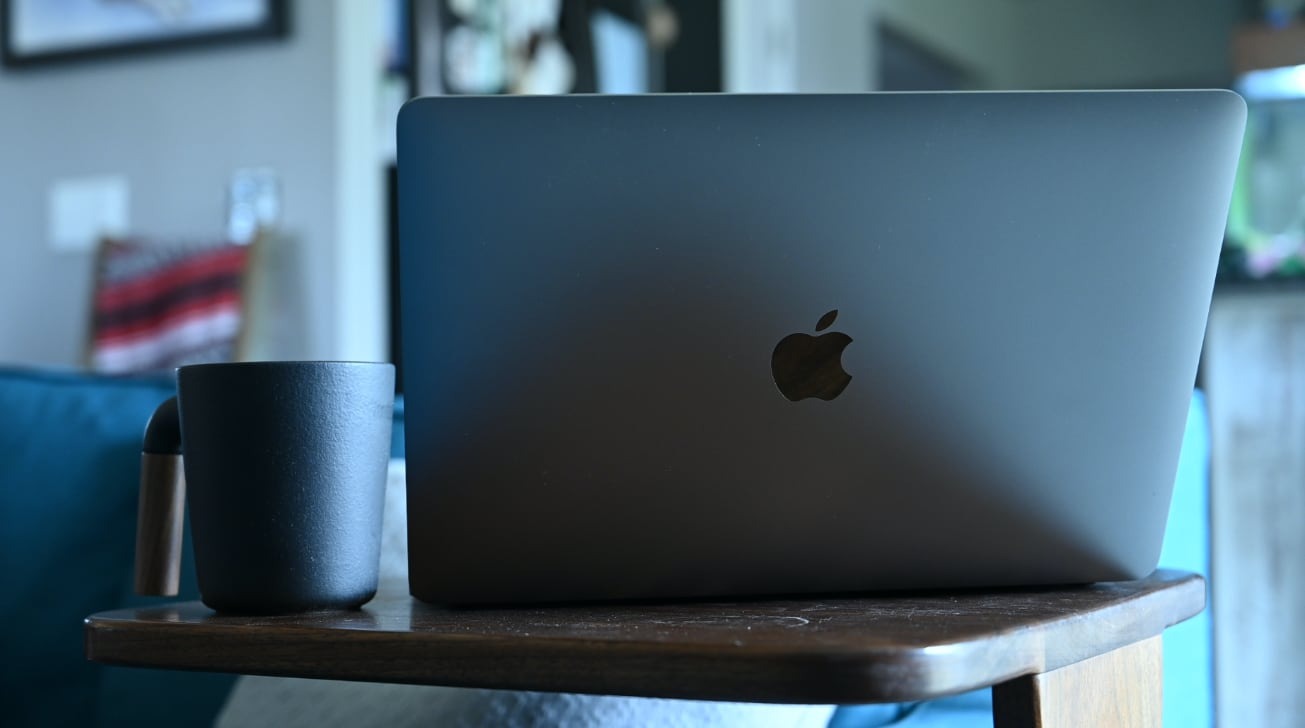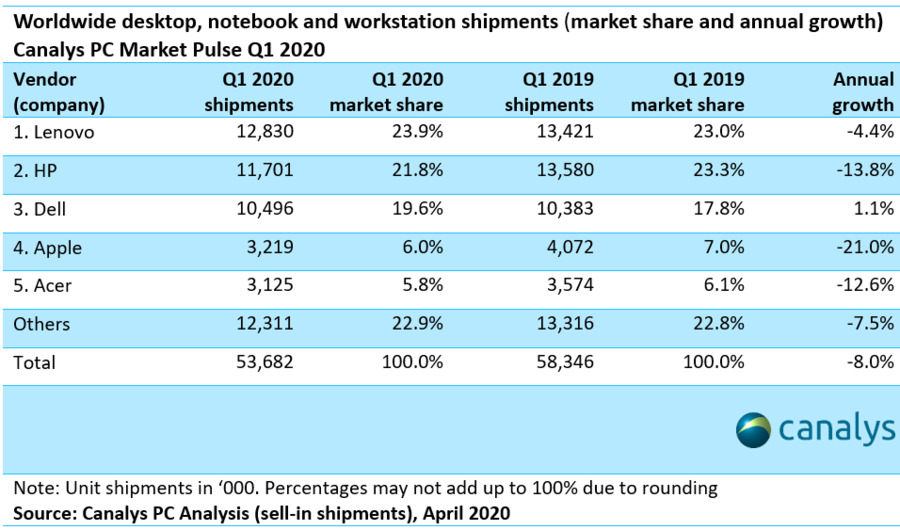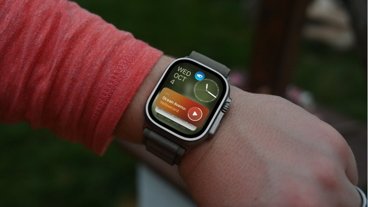Mac shipments declined in the first quarter of 2020, analysts claim, but while PC shipments overall went down by 8% year-on-year, Apple's annual decline in the PC market is more than double that of the global average.
During the global coronavirus pandemic, the demand for computers to work from home has soared, as people and companies try to replicate their working conditions within the safety of their house or apartment. Despite this, issues at production facilities related to COVID-19 meant firms couldn't gear up production to match the demand, and even hurt the industry as a whole.
In an analysis from Canalys, global PC shipments fall by 8% year-on-year for the first quarter, a drop from 58.3 million units in Q1 2019 to 53.7 million for the same period in 2020.
Of the top five vendors monitored by Canalys, Apple was the worst hit in the deceleration, with the drop from 4 million units in Q1 2019 to 3.2 million in Q1 2020 representing a decline of 21% year-on-year. It also represents a contraction in market share, from 7% in the 2019 quarter to 6% in 2020, but Apple still manages to maintain its fourth-place position on the chart.
"The PC industry has been boosted by the global COVID-19 lockdown, with products flying off the shelves throughout Q1," said Canalys research director Rushabh Doshi. "But PC makers started 2020 with a constrained supply of Intel processors, caused by a botched transition to 10nm nodes. This was exacerbated when factories in China were unable to reopen after the lunar new year holidays."
Apple's YoY percentage decline is by far the largest among vendors, with second-place HP being the nearest with an annual shrinkage of 13.8%, followed by fifth-place Ace at 12.6% down. First place Lenovo saw annual growth drop 4.4%, but it managed to gain market share, from 23% to 23.9%.
The main beneficiary is Dell, which is in third place on the chart. By seeing annual growth of 1.1% in the quarter, Dell's market share for the period increased from 17.8% for Q1 2019 to 19.6% in Q1 2020.
Canalys analyst Ishan Dutt warns that, while the production constraints will probably ease in Q2, at the same time the demand for computers in Q1 is unlikely to be sustained for very long, and with a dreary outlook for the rest of the year. "Few businesses will be spending on technology for their offices, while many homes will have been freshly equipped," Dutt suggests.
It remains to be seen how other elements of Apple's empire will fare with the ongoing medical crisis, but early reports suggested some areas may do surprisingly well. In February, it's as reported there was an increased demand for tablets in a traditionally "slow season" for the products, which may help raise iPad sales.
 Malcolm Owen
Malcolm Owen








-m.jpg)






 William Gallagher
William Gallagher
 Wesley Hilliard
Wesley Hilliard

 Christine McKee
Christine McKee


 Andrew Orr
Andrew Orr




-m.jpg)




65 Comments
As long as there is some kind of event (exceptional in this case) that explains the decline with regards to the real demand, there is nothing to be concerned about. Those who needed a computer and had to rush to get one for teleworking had no incentive to get a comparatively expensive Mac for the tasks required of them.
With the recent adjustments in pricing of the Air and the rumoured MBP13 with better keyboards, demand should even itself out with supply if production and logistics get back to normal levels.
If the drop is confirmed relative to PC shipments, I don't think it will be indicative of anything substantial.
Apple’s market share is minuscule. Their overall pricing is higher than PC’s. Overall Apple’s products are of a higher quality, but you pay a premium for that. In a recession price sensitivity increases and I would predict demand for all of Apple’s products, including iPhones, will decrease significantly. The PC world is still dominated by Windows. The growth of cloud services should increase the ability of Apple to sell product in the corporate world, but the price premium may ultimately hinder that.
It's almost all down to price. Macs (outside the US at least) are very expensive. Yes the hardware lasts a long time, and once upon a time macOS support would way outlast the time Windows would run reasonably on PCs - 3ish years at most. Nowadays Windows 10 runs just fine on old Macs that Apple has long since dropped support for. My 2009(!) MacBook is stuck on 10.13 but runs Win 10 fine - though drivers are an issue as Apple doesn't support Win10 on this machine. Unfortunately macOS isn't orders of magnitude better than Windows anymore, Windows has come a long way since the XP and Vista days. The Apple tax seems to be increasing for a ever decreasing value of the macOS. The hardware is great, second to none, and the integration between Apple services and macOS is good. But most people just can't afford to spend £1000+ on a computer, and especially now when even low-end computers are quick enough for most people, people can't justify spending double for an Apple logo and the macOS. Especially since Apple's motto these days seems to be to remove more features from macOS than they add - I remember more things that're missing than have been added in the past few iterations.
Many here were saying the price of the iPhone wasn't the reason sales dipped, but then Apple dropped the price of the iPhone and they sold more than ever before. So trying to claim price isn't a huge factor is entirely false.